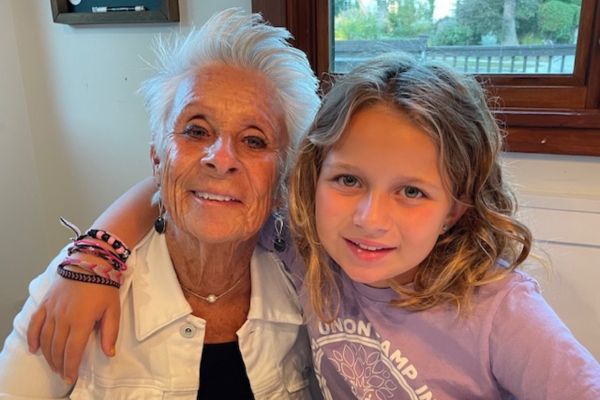To Tell or Not to Tell: “I Have Cancer”
by Lynn Aspey, MS
Do you ever wonder why adults have a challenging time talking with or staying friends with someone who has been diagnosed with cancer? Why is cancer so scary for some people to even address with their friend? Many times, it becomes the elephant in the room.
When I was diagnosed with cancer my family did not want me to share with my grandchild that I had cancer until she was 11. However, while my daughter and grandchild (who was three at the time) were visiting and we were at our condo pool, my granddaughter overheard a conversation that I had cancer. Her first words to my husband were: “Papa, is Mimi going to die?” Papa said: “Mimi has a cancer called leukemia, and she takes a very good special medicine and is doing just fine.” No questions were ever asked again.
I have concluded that while we want to protect children and allow them to just be a child without any worries, life happens to those that children love, too. If cancer is discussed with children in a simple, gentle, and loving way, children can develop empathy and the ability to deal with adversity as they age. Growing into adults I believe they might be able to lead with empathy and kindness, openness, and helpfulness, versus fear and avoidance.
My Granddaughter turned 11 recently, and I welcomed the opportunity to share with her my cancer story. What if something had happened to me and she had not been made aware? I began with all the “things” Mimi can do.
· Does Mimi exercise regularly? – yes!
· Does Mimi bake your favorite cookies like a crazy woman? – yes!
· Does Mimi play dominoes weekly with friends? – yes!
· Does Mimi travel clear across the country (OH to CA) to be with you? – yes!
“Honey, Mimi has a cancer called leukemia. Currently, I am in remission and that means my cancer is on ‘vacation’”. She asked: “Can the cancer come back?” “It can and probably will, but Mimi has wonderful doctors and there are new treatments all the time. I want you to know you can ask me questions anytime and I will give you honest answers. The only thing you can help me with is when we have played and played, Mimi gets very tired, and we will need a movie to rest or a restful activity.”
So, you ask, what if someone has a cancer that is active and not in remission? I might suggest having grandchildren help when they can. The benefits to a child who is helping someone ill are impactful to both the child and the person who is ill. Along with cancer, I have serious back issues in addition to my cancer, and my 7-year-old grandchild gets me pillows for my back to make sure I am comfortable and not hurting. As children assist in helping to take care of an ill parent or grandparent, they learn empathy, compassion, and how to be tender and kind. Someone I met who had cancer talked about the cycle of life with her grandchildren. However you choose to talk with children about cancer, they do not need all the details. Children need time to process information. Answers should be honest, clear, and precise using words a child understands.
Children will possibly experience classmates who get cancer. Instead of ignoring the child who is ill, they can learn to be a “special caring friend.” I remember a child in my class had bone cancer and had a leg amputated. The teacher assigned me to accompany her to the bathroom to make sure she did not fall. To this day, I remember what it meant to reach out to someone in need. My friend ultimately passed away. Even as a child I felt this loss tremendously, but I knew I had been by her side. Isn’t that what we all ask for? One of my closest friends said to me, “I will be with you through your journey,” and she has. Her words meant I had a friend with me on my cancer journey.
Lynn Aspey is a 7-year CLL survivor (chronic lymphocytic leukemia) who has completed two clinical trials, and many “trials and tribulations” during her cancer journey. She is a patient at The Ohio State University Wexner Medical Center under the care of oncologist Jennifer Woyach, MD, where she also volunteers on the Patient and Family Policy Committee and Hope Foundation. Lynn has a BSHEc and MS in Child Development & Family Living from Ohio University. Now retired, she was Director of Business Relations at Jewish Family Services for several decades. She has been married to her college sweetheart Wayne Aspey for 54 years, and they are the loving parents of Chantelle and Ryan, and the doting grandparents of Charley and Parker.
Everyone has a unique story to share. Do you want to share your survivor story?
We consider a cancer survivor to be anyone living with a history of cancer –
from diagnosis through the remainder of life.
Here are our submission guidelines.


